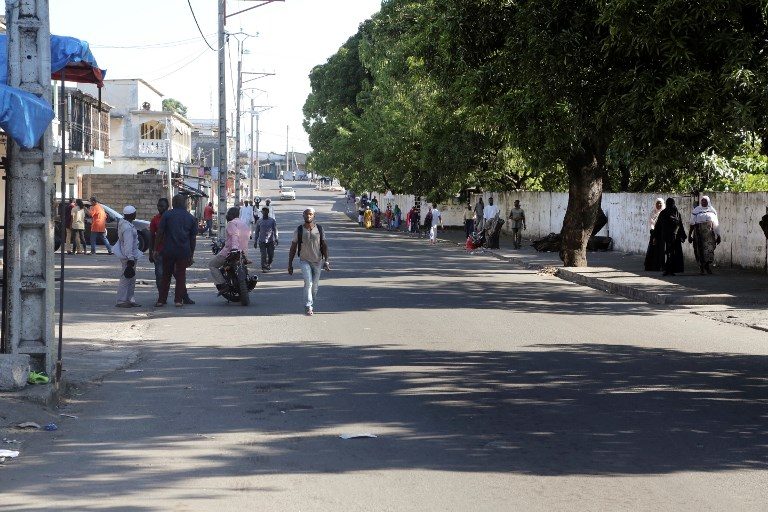SUMMARY
This is AI generated summarization, which may have errors. For context, always refer to the full article.

MORONI, Comoros – Gunfire rocked the Comoran capital Thursday, March 28, after police arrested a defeated presidential hopeful who was named head of an opposition transitional authority hoping to unseat President Azali Assoumani.
Interior Minister Mohamed “Kiki” Daoudou confirmed to Agence France-Presse (AFP) that gunfire had erupted near a military base in Moroni Thursday but insisted the situation in the coup-prone nation was “under control.”
“We are now attending to the injured,” he said, but declined to give an estimate of the extent of the bloodshed.
At least one soldier was injured in the clashes and taken for treatment in an army 4X4 that sped through the city center with its horn blaring, according to an AFP reporter.
Civilians deserted the streets of Moroni, police fired teargas and taxis stopped collecting passengers, an AFP correspondent saw, following the crackle of gunfire around the Kandani base.
An aide earlier confirmed the arrest of former military colonel Soilihi Mohamed, who came fourth in the poll on Sunday, March 24, which the opposition said was rigged by the government.
He remains in police custody, according to a military source.
‘Peaceful transition’?
His transitional council is backed by all 12 of the defeated presidential candidates and has pledged to manage a “peaceful transition.”
“There is major confusion here. A dozen or so heavily armed men tried to seize a barracks following the arrest of the colonel (Soilihi Mohamed). There was also gunfire in town, but not much and it died down quickly,” said a Western source in Moroni.
Comoros has had a volatile political history since independence in 1975 and has endured more than 20 attempted coups, 4 of which were successful.
Protesters took to the streets of Moroni’s northern TP district, and the presidential palace at Itsandra was locked down following the disturbances.
Earlier, police broke up a women’s protest march and arrested 12 demonstrators.
The opposition has flatly rejected Azali’s victory as the angry mood threatened to spark a new political crisis on the Indian Ocean archipelago.
Iain Walker, a researcher at the Martin Luther University Halle-Wittenberg, said a power shift to the opposition council “would probably require support from the army – which seems to be pro-Azali for the moment.”
Council leader Mohamed had previously said that the opposition “will use all peaceful means to oust the government.”
Azali initially came to power in a coup, then ruled the country between 1999 and 2006, and was re-elected in 2016. He left his 12 poll rivals trailing on Sunday.
Both observers and community groups have questioned the credibility of the election, which saw Azali declared the winner with almost 61% of the vote. The result, from a turnout of just under 54%, meant that he would not need to contest a second round to be named victor.
‘It’s not the street which rules’
Polling stations were ransacked, ballot boxes stuffed by police and observers prevented from overseeing the integrity of the vote, according to several witnesses.
The women arrested on Thursday were part of a march by roughly 100 activists to the Supreme Court where they were planning to appeal for the results to be nullified.
Armed police scattered the protesters, and 12 were arrested for unspecified crimes.
“We have had enough of what’s happening. We wanted to deliver a memorandum to the Supreme Court but we weren’t able to,” march organizer Samoa Abdoulmadjid told AFP.
“The police arrived and started rounding people up.”
Opposition parties have opted not to appeal the vote’s outcome but called instead for new polls to be held as soon as possible.
Interior Minister Daoudou has dismissed criticism of the polls’ conduct and declared: “It’s not the street which rules the country.”
For months the opposition has accused Azali of behaving like a dictator.
Azali staged the poll after Comorans voted in a referendum, boycotted by the opposition, to support the extension of presidential mandates from one five-year term to two.
He could theoretically rule until 2029, critics say. Several opposition figures were arrested around the time of the referendum.
The change upset a fragile balance of power established in 2001 that sought to end separatist crises on Anjouan and Moheli islands, and halt an endless cycle of coups. – Rappler.com
Add a comment
How does this make you feel?
There are no comments yet. Add your comment to start the conversation.